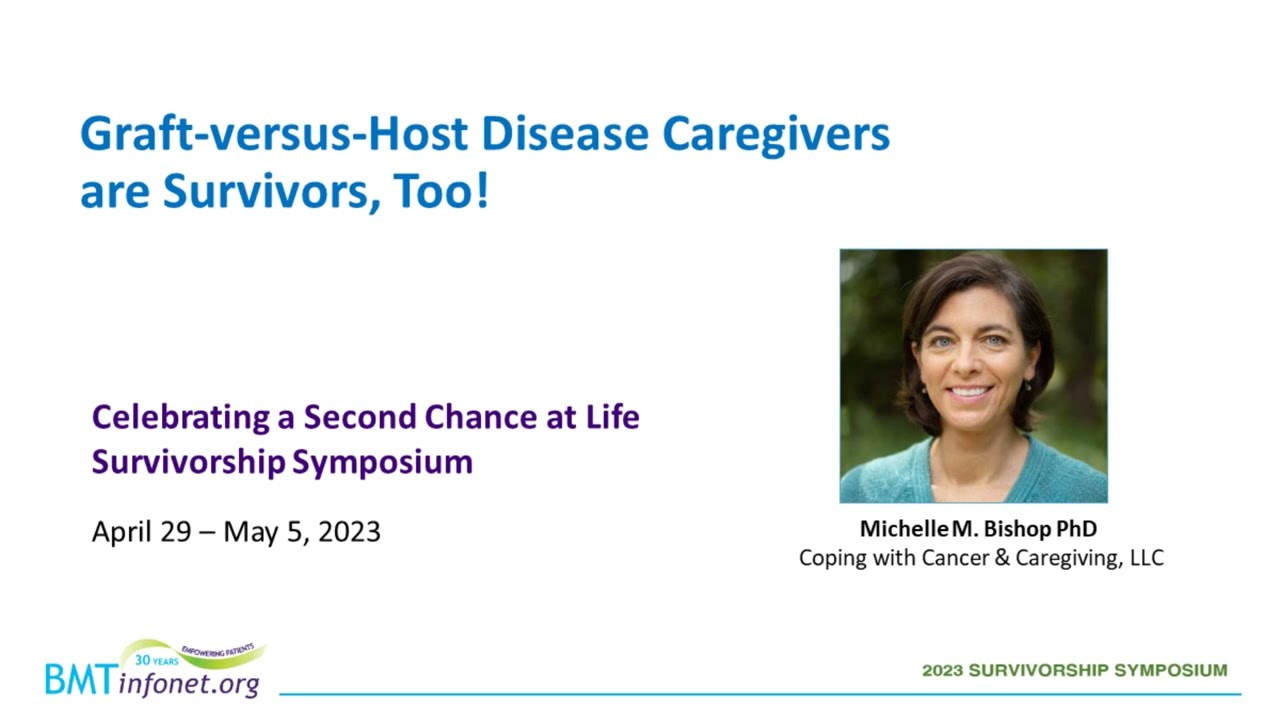GVHD Caregivers
Being the caregiver for someone who has graft-versus-host disease (GVHD) can be challenging, both physically and emotionally.
Caring for a loved one with GVHD involves juggling many tasks. Caregivers need to:
- assume some of the medical duties that nurses provided while the patient was hospitalized
- ensure the patient follows the treatment plan prescribed by the medical team
- acquire and dispense the many medications the GVHD patient needs daily
- schedule and coordinate transportation to clinic and specialist visits
- monitor the patient for new or worsening symptoms
- communicate any change in the patient’s condition to the healthcare team
- protect the patient from sources of infection
- prepare nutritional meals
- provide the patient with emotional support
- manage usual household chores such as paying bills, childcare, home maintenance, running errands, and work
The course of GVHD can be uncertain, with many ups and downs and unexpected twists and turns. If it becomes a chronic disease, you'll need to adapt and manage it for longer than anticipated. It’s important to build resilience and take care of yourself so that you remain well and strong through the weeks and months ahead.
Take Care of Your Physical Well-Being
To be an effective caregiver, you must maintain good physical condition. This includes eating well-balanced meals, getting daily exercise, and getting sufficient sleep each night.
Although it can be hard, try to prioritize your own health care. Remember, if you become ill, you will not be able to care for your loved one.
Create a daily routine, with time built in to do things that will keep you strong and healthy. Think about ways to burn off stress with physical movement, such as walking or yoga.
If you have any health issues, don’t ignore them or put them off. Keeping yourself strong and healthy is important for both you and your loved one with GVHD.
Take Care of Your Emotional Well-Being
Caring for someone with GVHD is stressful. Fear of the unknown, frustration over things like getting appropriate medical help, wanting support from family and friends, and just plain exhaustion can put your emotional health in jeopardy.
Don’t ignore your feelings. If you don’t deal with them, they will deal with you.
Emotional burnout is common after long periods of caregiving. It’s best to seek help before distress causes other health problems.
Find someone with whom you can honestly express your feelings and discuss your worries. This could be:
- a trusted family member, friend, or religious counselor
- another caregiver of a GVHD patient (find one through BMT InfoNet's Caring Connections Program)
- a GVHD support group (BMT InfoNet's GVHD support groups)
- a Facebook group
- a mental health professional (see BMT InfoNet's Directory of Mental Health Providers)
Gather a Team of Helpers
Don’t try to go it alone. It is hard to manage all the things you need to do for the patient and your own needs. A good support network is essential.
People are often eager to help if they know exactly what you need. Make a list of all the activities that could be done by someone else, and then reach out to family and friends to see who can help. Build in ongoing support if you can, so you don’t have to keep asking for help.
Can someone occasionally or routinely shop for you? Pick up medications? Take the children to activities? Mow your lawn? Make dinner? Walk the dog?
See if a family member or friend will organize the help for you. Many online programs are available to schedule meals and other help for people with chronic health issues. Some to check out include:
Dealing with Uncertainty
One of the most challenging aspects of being a caregiver for someone with GVHD is the uncertainty - not knowing how long the GVHD will last, whether it will get better or worse, and how long your loved one with GVHD will depend on you for help.
Some caregivers view 100 days after transplant as the finish line, but it’s often just the start of a new phase of caregiving. Chronic GVHD usually begins eight or nine months after transplant, so treatment and caregiving duties may be needed much longer.
It is good to be optimistic but realistic as well. Your loved one may be one of the many patients who gets a mild case of GVHD that resolves in a few months. But just in case, prepare yourself mentally for the possibility that you may need to deal with GVHD and caregiving for a much longer period of time.
Changing Relationships
The role of the caregiver can create a different type of relationship between you and the person with GVHD, at least for a time. If you're caring for a spouse or partner, you may find yourself in a nurse/patient role instead of being equal partners. It’s common for differences to arise over how much care you should be providing or how hard you should be pushing the patient to do various things, which can lead to frustration, resentment, and anger for both parties.
Communication is key. Bottling up frustration is not healthy. Try using ‘I’ statements, such as ‘I am feeling frustrated’ rather than ‘You’ statements, such as ‘You make me mad’. Think about caregiving as ‘care-partnering’. Work together to name challenges and problem-solve them together.
Encourage the patient to do what he or she can without help so you both maintain as much independence and self-identity as possible. Don’t forget to spend time together doing things you enjoy that are not medical in nature.
Sometimes, relationships with extended family members or friends can also become strained. It is difficult for people unfamiliar with GVHD to understand how much it can impact daily life and health, particularly if the patient does not show obvious symptoms. Describing GVHD to family and friends as a chronic disease, like diabetes or multiple sclerosis, may help them better understand that issues are ongoing.
If extended family members and friends are interested in learning more about what you are going through, you can share this website with them or suggest they order the free booklet Graft-versus-Host Disease: What to Know, What to Do that contains similar information.
Give Yourself the Credit You’re Due
You are a vital member of the healthcare team working to help your loved one recover. Acknowledge your hard work and take pride in mastering the many tasks you once may have thought could not do.
Sometimes, despite your best efforts, problems like an infection may occur, or things don’t go as planned. It can be easy to question yourself and wonder if something you did caused the problem.
Resist the urge to blame yourself. Like everyone involved in patient care, you are doing your best and not everything is within your power to control. Try to show yourself the same compassion as you would for a friend.
Silver Linings
Despite the difficulty of living with GVHD, many people say the experience has some silver linings. Caregiving can feel rewarding and meaningful.
Some couples grow closer together. Some caregivers find a new sense of how capable they are, despite adversity. Some learn new ways of problem-solving or make new friendships. Many describe changes in their perspective and have a new appreciation for life.
Watch the video GVHD Caregivers are Survivors, Too.
Click here to read a transcript of the video.



